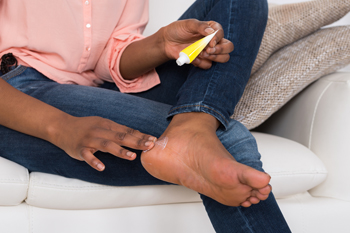
Cracked heels often stem from various factors, including obesity, wearing ill-fitting shoes, prolonged standing, and dry skin. When the skin on your feet lacks moisture and becomes stiff, it is more susceptible to cracking, especially under pressure while standing or walking. Certain conditions, such as diabetes, psoriasis, and flat feet, can further dry out the skin and increase the risk of cracked heels or painful fissures. Preventative measures include moisturizing regularly, avoiding harsh soaps, and opting for closed-heeled shoes with ample cushioning. Wearing cotton socks can also help to reduce friction. Mild relief typically involves moisturizers containing ingredients like urea or hyaluronic acid, which help retain moisture and soften the skin. While mild cases can often be managed at home, it is important to see a podiatrist if heel cracks are associated with a medical condition or if they have become infected. Seeking professional advice ensures a proper diagnosis and treatment, leading to quicker healing and long-term foot health. If cracked and painful heels are causing you discomfort, it is suggested that you schedule an appointment with a podiatrist.
If the skin on your feet starts to crack, you may want to see a podiatrist to find treatment. If you have any concerns, contact Michael Bess, DPM from Florida. Our podiatrist can provide the care you need to keep you pain-free and on your feet.
Cracked Heels
It is important to moisturize your cracked heels in order to prevent pain, bleeding, and infection. The reason cracked heels form is because the skin on the foot is too dry to support the immense pressure placed on them. When the foot expands, the dry skin on the foot begins to split.
Ways to Help Heal Them
- Invest in a good foot cream
- Try Using Petroleum Jelly
- Ease up on Soaps
- Drink Plenty of Water
Ways to Prevent Cracked Heels
- Moisturize After Showering
- Skip a Shower
- Keep Shower Water Lukewarm
- Don’t Scrub Your Feet
If you are unsure how to proceed in treating cracked heels, seek guidance from a podiatrist. Your doctor will help you with any questions or information you may need.
If you have any questions, please feel free to contact our office located in West Palm Beach, FL . We offer the newest diagnostic and treatment technologies for all your foot care needs.
